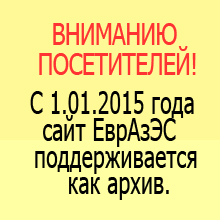|
Версия для печати
TREATY TREATY on the Customs union and the Common economic space of 26 February 19991 TREATY on the Customs union and the Common economic space of 26 February 19991
The member-states of this Treaty, hereinafter referred to as the Parties, GUIDED by the Treaty between the Republic of Belarus, the Republic of Kazakhstan, the Kyrgyz Republic and the Russian Federation on increased Integration in the Economic and Humanitarian Fields of 29 March 1996, hereinafter referred to as the Treaty of 29 March 1996, and the previously signed treaties on its implementation, and taking into consideration the resolutions adopted by the integration management organs; OBSERVING the agreements signed by the Parties on free trade, on uniform regulation of foreign economic activities, on a customs union, on ensuring the mutual convertibility and stabilization of national currency exchange rates, and on the elimination of double taxation and prevention of income and capital tax evasion; BASED on the existing industrial, scientific and technological ties, interdependence and complementary nature of the economies; DETERMINED to give a new stimulus to increased integration and the convergence of the member states’ economies for the sake of social progress and improvement in the welfare of their nations; ADMITTING that elimination of the existing barriers and restrictions requires coordinated action, the harmonized development of market relations among the member states and the creation of equal conditions and opportunities for business entities; REAFFIRMING friendly relations connecting the states and the nations, willing to ensure their prosperity, based on the principles of the Charter of the United Nations, the Charter of the Commonwealth of Independent States, and the Treaty on the Establishment of the Economic Union of September 24, 1993, and generally accepted principles and rules of international law; TAKING INTO CONSIDERATION the Parties’ endeavor to join the World Trade Organization; RESPECTING sovereignty and territorial integrity of the states and ensuring non-interference in domestic affairs; EXPRESSING DETERMINATION to complete the formation of a customs union and create a common economic space, have agreed as follows: Chapter I. CONCEPTS AND TERMS
Article 1
For the purposes of the present Treaty the meaning of the concepts and terms below shall be as follows: 1) The Common economic space is the space that includes the territories of the Parties with uniform mechanisms of economy regulation based on free trade principles and harmonized legislation; with a single infrastructure and coordinated taxation, monetary, credit, financial, trading and customs policy, which provides a free flow of goods, services, capital and work force; 2) The common customs territory is the territory that includes the customs territories of the Parties, where the Parties apply the Unified Customs Tariff, take unified non-tariff regulating measures, follow unified customs rules and exert unified control over customs offices, and where customs supervision at the internal customs border is abolished; 3) The common (internal) market is the scope of economic relations in the common customs territory; 4) The unified customs tariff is an agreed list of unified import duties applied to goods imported to customs territories of the member states of a customs union from third states, categorized in compliance with the Common commodity classification for foreign-economic activities of the Commonwealth of Independent States; 5) The internal customs border is the boundary of a Party’s customs territory, being at the same time a boundary of the customs territory of another Party; 6) The external customs border (external perimeter) is the boundary of a common customs territory of the member states in the Customs union, dividing the territories of the member states and the territories of the states outside the customs union; 7) Indirect taxes are represented by value added tax and excise duties on goods and services.
Chapter II. GENERAL PROVISIONS
Article 2
Pursuant to the terms of this Agreement the Parties shall undertake to complete the formation of a customs union and create a common economic space on this basis. Article 3
The main goals of forming the Common economic space shall be as follows: efficient performance of the common (internal) market for goods, services, capital and labor; creating conditions for the steady progress of structural reform in the Parties’ economies in order to improve the living standards of their population; carrying out a coordinated taxation, monetary, credit, currency, financial, trading and customs policy; development of common transportation, energy and information systems; creating unified arrangements for state support to priority industries and to technological and scientific cooperation.
Article 4
The essential principles of establishing the Common economic space shall be: the principle of non-discrimination; the principle of mutual benefit; common (universal) principles: mutual aid, free will, equality of rights, responsibility for undertaken obligations and transparency.
Article 5
The Customs union and the Common economic space shall be formed with the support of the following integration management organs: – the Interstate Council, – the Council of Heads of Governments, – the Integration Committee, – the Inter-parliamentary Committee. Each integration management organ shall act within the limits of its powers, defined by the Regulations of this organ. Other integration management organs may be established by decision of the Interstate Council.
Article 6
The member states shall agree on the economic policy for building the customs union and the common economic space in accordance with provisions of the Treaty of March 29, 1996, the treaties concluded by the Parties and the resolutions adopted in pursuit of their implementation. The Parties shall undertake to refrain from any actions that could place the goals of this Treaty under threat.
Article 7
The Common economic space shall be built in stages. The duration of stages, the scope of activities at each stage and their implementation shall be defined by the Interstate Council. The transition from one stage to another shall be conditioned by the actual achievement of the specific goals set by the present Treaty and the fulfillment of obligations by the Parties. The goal of the first stage shall be to complete the formation of the Customs union and the common customs territory. The second stage shall envisage the creation of the Common economic space, including the common (internal) market of goods, services, capital and labor, a unified economic policy, a single infrastructure and harmonization of the Parties’ legislation to provide for the functioning of the common economic space. On the later stages of economic cooperation the Parties shall endeavor to agree on the target values of the main macroeconomic indexes.
Chapter III. COMPLETION OF FORMATION OF THE CUSTOMS UNION
PART 1. FREE TRADE REGIME FOR GOODS
Article 8
The Parties shall mutually provide a free trade regime for goods to the full extent, without exceptions and restrictions, in accordance with the bilateral and multilateral free trade treatments in force.
Article 9
The Parties shall proclaim the following goals of the free trade regime for goods: a) non-use of tariff and quantitative restrictions with regard to goods originating from the customs territory of one of the Parties and exported (imported) to the customs territory of another Party and meant for free circulation in the customs territory of the Parties; b) application of a unified system of indirect taxes; c) no restrictions on one Party taking temporary protective measures with regard to imports from another Party in accordance with generally accepted principles and rules of international law or the national legislation; d) the Parties shall not provide to any third state which is not a Party of the present Treaty and has a more favorable trade regime than that provided by the Parties to one another without the other Parties’ consent; e) elimination of restrictions on competition caused by market entities or by the interference of national or local authorities to an extent that it can influence the mutual commerce conducted by market entities of the Parties; f) the Parties must refrain from taking any measures (including collective measures) of a restrictive or fiscal nature that can directly or indirectly lead to discrimination of goods originating from the customs territory of one of the Parties in comparison to similar goods originating from the customs territory of another Party.
Article 10
The Parties shall make every effort to eliminate on their territories administrative and fiscal obstacles of a local or regional character that hamper the normal operation of a free trade regime for goods. For the purposes of this article of the present Treaty nothing shall prevent the Parties from applying national legislation regarding entry, habitation, work, setting up firms and companies, rendering services by physical and legal persons. In this case they should apply the procedures so they will not annul or limit benefits derived by any of the Parties due to the present Treaty.
PART 2. REGULATION OF foreign TRADE OF GOODS
Article 11
The Parties shall set the unified control of foreign trade activities in line with their obligations arising from the treaties on the customs union and through harmonization of standards and rules envisaged by bilateral agreements on the unified control of foreign trade activities, acting on the date the present Treaty enters into force. Article 12
The unified control of foreign trade activity and coordinated decision making on the simultaneous introduction of changes or amendments thereto shall includes the following areas: 1) tariff regulation of foreign trade activity; 2) non-tariff measures for trade with third states; 3) setting up a trade regime for third states; 4) indirect taxation of foreign trade transactions with the third states; 5) currency regulation of foreign trade transactions.
Article 13
Following the Resolution of the Council of Heads of Governments of January 22, 1998 No.2 “On the unified customs tariff of member states in the customs union treaties”, the Parties shall sign the corresponding treaties. In trade with third states the Parties shall apply the agreed system of incentive tariff rates and preferential duties, including the unified procedure for introducing changes or amendments thereto. The Parties shall agree that the procedure of collection and receipt of customs duties, taxes and dues with the equivalent impact should be defined by separate treaties. In preparing the above treaties the Parties shall take account of the adopted resolutions and the follow-up agreements that shall be reached on this matter by the Parties on a bilateral or multilateral basis.
Article 14
The Parties shall observe the unified procedure for non-tariff regulation in trade with third states, and for theses purposes they apply to the full extent the Treaty on Unified Non-Tariff Regulatory Measures Associated with the Establishment of the Customs Union of October 22, 1997. The unified order of regulating foreign trade activity shall not be applicable to the trade of arms, defense technology and other defense products, to nuclear materials, equipment, special non-nuclear materials and the respective technologies, as well as dual purpose goods and technologies, indicated in Article 5 of the Treaty on Unified Non-Tariff Regulatory Measures Associated with the Establishment of a Customs Union. The Parties shall sign a separate Treaty for these purposes. Article 15
With respect to trade of goods with third states, the Parties shall take coordinated actions for the phased establishment of a unified trade regime. As a rule the Parties shall simultaneously introduce changes in the trade regime with respect to third states and introduce or abolish tariff or non-tariff restrictions in trade of goods, including temporary restrictions. For these purposes the Parties shall sign the corresponding protocols. Regarding trade with countries which signed a free trade agreement with one of the Parties, this Party shall agree with the other Parties of the present Treaty on the list of exceptions and restrictions of the free trade regime or measures to compensate for the difference in trade regimes. Independent negotiations of the Parties on joining the World Trade Organization and the process of their integration into international economic and financial structures should not be an insuperable obstacle in their pursuit to ensure the phased harmonization of their trade regimes. In order to reach the required level of agreement between negotiated positions the Parties shall effectively use the mechanism of regular council envisaged by the Protocol on international trade talks between member states of the customs union on joining the World Trade Organization of June 3, 1997, and the Resolution of the Interstate Council of April 28, 1998, No.27.
Article 16
The Parties shall use a unified system of indirect tax collection in trade with third states. Indirect tax rates for exported and imported goods shall not exceed similar rates for domestic goods. Regarding the indirect tax collection in trade with third states, the Parties shall turn to the country of origin principle. When importing and exporting goods in trade with third countries the Parties shall refrain from granting individual tax benefits with regard to rates and levy procedures of value added tax and excise duties on the goods liable thereto. Any of the Parties shall be eligible to require from another Party information on the use of tax rates, method of tax collection and tax benefits to residents and non-residents engaged in trading goods from third states; such information should be provided within thirty calendar days. Article 17 The Parties shall use agreed procedure for currency control of foreign trade transactions based on the monitoring of the member states’ respective legislations and the regular exchange of information between central (national) banks, also using other information on current and capital transactions of the balance of payments. In future the Parties shall devise a separate Treaty on using a common system of currency control. Article 18 The Parties shall affirm that the unified procedure for foreign trade activity control shall be established as soon as it is permitted by the unification of legislation, taking into account the current and long-term foreign trade and economic interests and potentials of the Parties. Any changes or amendments to the unified procedure for foreign trade activity control with respect to the areas indicated in Article 12 of the present Treaty shall be made upon the Parties’ agreement on the stage of draft resolutions by governments of the Parties. The Parties shall be eligible to introduce individual temporary restrictions in trade with third states in compliance with generally accepted principles and rules of international law. Such measures shall be of a temporary nature and shall be applied in accordance with procedures set up by the Parties.
Article 19 The Parties shall regard the use of a unified procedure for foreign trade activity control as the most important factor and a necessary condition for establishing a mutual free trade regime without exceptions and restrictions. Withdrawal of a Party from the unified procedure for foreign trade activity control envisaged by Articles 11–18 of the present Treaty may be regarded by any Party/Parties as grounds for raising the question of terminating the free trade regime without exceptions and restrictions for such a Party.
PART 3. CUSTOMS UNION
Article 20 The Parties shall affirm that their endeavor to ensure the completion of the Customs union establishment is based on a free trade regime, phased adoption of a unified procedure for foreign trade activity control and the fulfillment of obligations arising from principles and provisions of the customs union treaties.
Article 21
In accordance with generally accepted international principles and rules the Parties shall establish the Customs union as a trade and economic association with the following characteristics: a) common customs territory; b) unified customs tariff; c) a regime in which neither tariff nor non-tariff (licensing or setting quotas) restrictions in mutual trade are acceptable, with the exception of cases envisaged by the present Treaty; d) simplification and subsequent abolishment of customs control at internal customs borders; e) similar mechanisms of economy and trade control based on universal market principles and harmonized economic legislation; f) management organs; g) unified customs policy and the use of common customs regimes. At the stage of customs union formation the Integration Committee shall act as its executive organ.
Article 22
Upon implementation of the terms envisaged by Article 21, goods imported from third states to the common customs territory and released for free circulation in one of the member states shall be transferred through internal customs borders without restrictions. The Parties shall unify the standards and rules of customs legalization and control with respect to goods originating from third states and shall sign the corresponding documents on simplification and subsequent abolishment of customs legalization and control at internal customs borders. On customs legalization of goods transferred by physical persons through internal borders of the customs union the Parties shall be guided by the Protocol on the simplified order of customs legalization of January 22, 1998, and in future they shall abolish the customs legalization and control at internal borders. For these purposes the Parties shall sign the corresponding documents. Article 23
The Parties shall sign additional agreements to determine the time frames for completion of Customs union formation, accounting for the generally accepted principles and rules of international law. On setting up trade regimes with third states the Parties shall provide a mutually preferential regime through exception from the most favored nation regime to the benefit of Parties joining the customs union.
Article 24
The Parties shall ensure a merger of the Parties’ customs territories into a Common customs territory as soon as necessary legal, economic and international conditions are created. For these purposes the Parties shall agree to sign the Treaty on completion of the customs union formation that would establish procedures for the functioning of the Common customs territory.
Chapter IV. CREATION OF COMMON ECONOMIC SPACE
PART 4. COMMON ECONOMIC POLICY AND DEVELOPMENT OF INFRASTRUCTURE
Article 25
The Parties shall agree on the main directions and stages of the structural reforms of the member states’ economies to ensure effective use of industrial capacity, creation of favorable investment climate, support of high-performance industries and execution of a coordinated antimonopoly, taxation and financial policy, as well as conditions for fair competition within the framework of the Common economic space.
Article 26
The Parties shall create necessary conditions for stable economic development of member states of the present Treaty and provide coordinated state support for priority industries and technologies, efficient conversion and the reform of defense enterprises. Article 27
Various types of subsidies (assistance) provided by a member state as a grant or with the use of state resources that impair or present a threat to competition through creating more favorable conditions to some enterprises or types of goods shall be regarded as incompatible with the principles of the common economic space to the extent that they affect trade between the Parties, except in the following cases: Social aid to individual consumers on condition this is provided without discrimination; Aid to repair damage caused by natural disasters or any other accidents, either natural or manmade; Subsidies to promote the social and economic development of regions where living standards are lower than the minimum of subsistence defined by each of the Parties, or regions with high unemployment; Subsidies contributing to a project of interstate importance or targeted to correct a serious economic disorder in a member state; Other types of subsidies (assistance) that can be defined by a resolution of the Interstate Council.
Article 28
The Parties shall use a unified system of indirect taxes in mutual trade on the country of destination principle and enter into a respective treaty. Rates of indirect taxes on imported goods in mutual trade should not exceed the rates set for similar domestic goods.
Article 29
In order to conclude the coordinated excise policy the Parties shall keep to the basic list of goods liable thereto, which were produced in or imported to the customs territories of the member states.
Article 30
To ensure full tax payments and exchange of information between tax administrations of the member states joining the present Treaty, the Parties shall observe the provisions of the Treaty on Cooperation and Mutual Assistance in Providing Compliance to Tax Legislation of the Parties of March 25, 1998, and the Resolution of the Council of Heads of Governments of January 22, 1998, No.4, based on interaction between tax administrations of the member states joining the Treaty of March 29, 1996.
Article 31
State regulation of the Parties’ economies shall be targeted at carrying out institutional reforms, efficient management of property, control of relations between various economic areas and the banking sector, and the creation of new arrangements to attract finance and the settling of interstate accounts.
Article 32
The Parties shall encourage creation of efficient complementary industries guided by economic interests of the states.
Article 33
The Parties shall take measures against abuse of a dominant position by one or several market entities in order to prevent the following: use of unfair competition practices; limitation of production, markets or technical development to the prejudice of consumers; use of unequal conditions in similar deals with different trading partners, consequently placing them in a disadvantageous competitive position. Should dumping practices be revealed, the Party suffering damage is eligible to take the adequate protective actions defined by its national legislation, upon agreement with the other Parties.
Article 34
The Parties shall establish the Transportation Union in accordance with the Treaty between the Republic of Belarus, the Republic of Kazakhstan, the Kyrgyz Republic and the Russian Federation on Forming the Transportation Union of January 22, 1998. The Parties shall define the Transportation Union as an integrated transportation system of the Parties, with mutually agreed technologies and characteristics and a unified legal base. Establishment of the Transportation Union shall be carried out in stages together with increased integration; this envisages actions to ensure legal, economic and administrative conditions for free traffic of transport facilities, passenger transportation and shipment of goods between the Parties, as well as the transit of goods in their territories. Establishment of a Transportation Union of member states shall be completed during the second stage.
Article 35
The Parties shall carry out transit in compliance with the Treaty on Unified Transit Rules for the Territories of Member States of the Customs Union of January 22, 1998.
Article 36
Member states shall implement a coordinated agricultural policy with joint financing of programs and projects to provide for the development of agricultural production in line with the list agreed by the Parties. In executing the common agricultural policy the Parties shall take into account the following: – necessity to provide food security for the member states of the Treaty; – particular nature of agricultural activity, conditioned by the industrial and social structure of agriculture and the natural conditions of the Parties; – necessity to improve the structure of agricultural production.
PART 5. COMMON MARKET of services
Article 37
The member states shall endeavor to mutually provide one another with a national regime for access to the services market. The Parties shall gradually eliminate restrictions on access to the national markets of services within the common economic space for legal and physical persons being the residents of member states of the present Treaty. For this purpose the Parties shall adopt a common program for developing trade in services within the framework of the common economic space and on drafting the above program the Parties shall keep to generally accepted principles and rules of international law. Article 38
The Parties shall carry out a coordinated policy of trade in services towards third states. On establishing the regime of trade in services with third states the Parties shall provide a mutually preferential treatment through exception from the most favored nation treatment to the benefit of Parties joining the customs union.
PART 6. COMMON LABOUR MARKET AND social policy
Article 39
The Parties shall provide free movement of member state citizens within the common economic space. Free movement envisages the abolition of any discrimination towards the Party’s citizens and creation of a unified legal regime regarding employment, remuneration and other employment and labor conditions. This implies the following capacities: – free movement across the Parties’ territories while engaged in labor activity; – simplification of procedures in acquiring and renouncing citizenship as far as possible; – provision of legal status to the Parties’ citizens residing on the territory of a Party, which should resemble the status of this Party’s citizens as far as possible; – free movement across borders and residence on the Parties’ territories with an internal passport indicating citizenship of one of the Parties; – setting unified rules for carrying foreign currency across the borders of member states and duty-free carriage of luggage; – national treatment afforded to citizens of the member states when they cross the state borders; – residence in one of the member states while engaged in labor activity in compliance with the labor legislation of this state; – residence on the territory of one of the member states upon completion of labor activity in this state. For these purposes the Parties shall sign the respective treaties.
Article 40
The Parties agreed that the labor time record of citizens engaged in labor activity on the territory of member states shall be included in the total time record, among other purposes, for setting pensions and benefits.
Article 41
From the date of signing the present Treaty the Parties shall introduce no additional restrictions on choosing a place of residence and economic activity on their territories for citizens of other member states without prior consent of the other Parties. The Parties shall gradually cancel restrictions on choosing the place of residence and economic activity, including the right to establish legal entities by the citizens of member states on the territories of other member states.
Article 42
The Parties shall conclude common entry permit policy towards third states, including the policy against uncontrolled migration. For these purposes the Parties shall sign the respective treaties.
Article 43
The Parties shall provide free first aid to citizens of other Parties staying on their territory. For this purpose the Parties shall sign the respective treaties.
Article 44
The Integration Committee in cooperation with the governments of the Parties shall study and analyze the social problems and provide the Council of Heads of Governments with its findings and recommendations on the following issues: – employment; – labor legislation and conditions of work; – vocational training and retraining; – development of basic social standards; – prevention of industrial accidents and occupational diseases; – occupational hygiene; – rights to establish professional associations and enter into collective agreements. Article 45
The Parties shall provide for creation of the agreed educational system, the system of vocational training and retraining, and unified rules and conditions for being enrolled in general education schools and vocational institutions, higher education institutions and post-graduate courses, as well as the mutual recognition and equivalence of education certificates, academic degrees and academic status.
PART 7. MOVEMENT OF CAPITAL
Article 46
While observing the agreements on mutual convertibility of national currencies, the Parties shall continue the gradual liberalization of their currency policy with respect to eliminating restrictions on use of foreign currencies in current operations, introducing a unified exchange rate for national currency in current operations of the balance of payments, admitting non-resident banks to domestic currency markets, abolishing restrictions on the import and export of national currencies by authorized banks, and joining the 8th article of the Charter of the International Monetary Fund. In order to take actions providing interaction of the national monetary and financial systems, and upon completion of these actions, the Parties shall sign the respective protocols.
Article 47
The Parties shall fulfill the provisions of treaties on the elimination of double taxation and the prevention of income and capital tax evasion.
Article 48
The Parties shall agree on the arrangements for setting the national currencies’ exchange rates. Article 49
The Parties shall create a system for settling the transaction of goods turnover in the interstate and private sectors, in the non-commercial sector, transportation and communication services and other industries, as well as for settling state, bank and commercial loans and currency exchange transactions between the member states.
Article 50
Each of the Parties shall be entitled to take temporary protective measures regarding the movement of capital with immediate notification to other Parties of the Treaty, if the current capital movements damage the operation of a domestic capital market.
Article 51
The Parties shall endeavor to intensify liberalization of capital movement as soon as it is permitted by improved economic conditions in the member states. The Parties shall not introduce new restrictions on currency operations that would hamper capital movements and the related current payments, beyond the existing restrictions, and shall not increase restrictions in the existing rules. The possibility of temporary non-application of the present article shall be governed by separate treaties.
PART 8. SCIENce, TECHONOLOGy and information development
Article 52
The Parties shall carry out a coordinated policy regarding science and technology. For these purposes they shall adopt a joint program on priority aspects of national scientific research, engineering work and pilot schemes for the integration and further development of the science and technology potential of member states.
Article 53
The joint program shall be implemented through specific programs developed for the main areas of activity. For each program there shall be specific methods of implementation, time frames and financing sources. Coordination of research activities and implementation of joint programs shall be carried out at a national level in cooperation with the Integration Committee.
Article 54
Fundamental and applied scientific research within the framework of interstate programs and projects shall be financed through government contracts, on commercial conditions and using the joint financing arrangement. The Parties shall create a unified system of scientific, technological, economic and legal information and the respective data banks.
Article 55
The Parties shall guarantee free exchange and broadcast of radio and television programs and other mass media in the Parties’ territories and access of legal and physical persons to telecommunication systems, with due regard for the national interests of the Parties and the increase in exchange of information with third states; the Parties shall enter into respective treaties.
Chapter V. CONVERGENCE AND UNIFICATION OF LEGISLATION
Article 56
The Parties shall take coordinated actions for convergence and unification of legislative and other legal acts of the Parties (hereinafter referred to as legal harmonization actions) that shall directly influence fulfillment by the Parties of the provisions put forward in the present Treaty. For the purposes of convergence and unification of legislations the Parties shall take actions including the following: a) coordination of drafting legislative and other legal acts, including legal acts on amending laws and other legal acts; b) entering into international treaties; c) adoption of model acts; d) adoption of respective resolutions by the Interstate Council, or the Council of Heads of Governments; e) other actions that the Parties find expedient and possible on the condition of approval by the Interstate Council. Article 57
The Interstate Council shall decide which legislative and other legal acts, taking into consideration the subject and goals of the present Treaty, are liable to convergence and unification, and define the order of respective legal harmonization actions. Such decisions may envisage legal harmonization actions both regarding the specific acts in force on the Parties’ territories, and the specific areas of legal regulation. The Interstate Council shall also decide which legal harmonization actions are to be taken towards the corresponding legislative and other legal acts of the Parties, or, taking into account the prior resolutions of the Interstate Council, towards a corresponding area of legal regulation.
Article 58
In cases where the Parties agree that it is necessary and justified, the Interstate Council shall have the right to carry out the following actions: a) adoption of resolutions setting uniform rules for member states of the present Treaty that are compulsory in all their parts and must be directly applied by the member states; b) adoption of resolutions that are compulsory for the member state(s) to which they are addressed with regard to expected outcome, with the Parties retaining the freedom to choose forms and methods of actions; c) issue of non-obligatory recommendations.
Article 59
Resolutions specified in Articles 57 and 58 of the present Treaty shall be adopted by the Interstate Council upon consultation with the Interparliamentary Committee and approval by the Council of Heads of Governments. Proposals on legal harmonization actions put forward by the Interparliamentary Committee shall be liable to prior review by the Integration Committee, which shall introduce the corresponding recommendations to the Council of Heads of Governments upon consulting the Interparliamentary Committee. The present provision does not limit the right of the Interparliamentary Committee to adopt model acts of a recommendatory nature, as stipulated in Article 22 of the Treaty of March 29, 1996. The proposals on legal harmonization actions should be based on unbiased and overall evaluation of the situation in the relevant area of legal regulation in the context of relations between member states and the problems arising thereupon, with the purpose to implement the objectives and principles of the present Treaty.
Article 60
Duties of the Interstate Council specified in Article 57 and the clauses b) and c) of Article 58 of the Present Treaty may be delegated to the Council of Heads of Governments, subject to the respective resolution by the Interstate Council.
Chapter VI. FINAL PROVISIONS
Article 61
In case of action or a threat of action on the part of third states that may damage the economy of one or several member states of the Treaty, at the suggestion of one or several Parties, the governments shall immediately hold a council for working out coordinated measures to avert economic damage or the threat of such damage.
Article 62
The present Treaty shall not apply to obligations of the Parties arising from previously signed international treaties with third states, including treaties within the Commonwealth of Independent States.
Article 63
The present Treaty shall be open to all States which recognize its principles, declare readiness to accept obligations arising from this Treaty to the full extent and submit the corresponding request to the Interstate Council via the depositary. The entry conditions for a third state shall be defined by the respective resolution of the Interstate Council.
Article 64
The Parties may submit proposals to the Interstate Council on introducing changes and amendments to the present Treaty. The Interstate Council shall unanimously take decisions on introducing changes and amendments into the present Treaty, such changes and amendments entering into force upon ratification by all member states.
Article 65
This Treaty shall be registered with the Secretariat of the United Nations.
Article 66
The Parties shall resolve the controversial issues that arise at fulfilling the Parties’ obligations or at interpreting and applying provisions of the present Treaty by holding council, by negotiations or other methods on which they have agreed. The Parties shall sign a treaty on the responsibility of the Parties for non-fulfillment of the obligations undertaken and arising from this Treaty.
Article 67
The seat of integration management organs shall be defined by the Interstate Council. The management organs shall operate on the territories of member states in compliance with separate treaties specifying the conditions of their seat.
Article 68
The depositary of the present Treaty shall be the Integration Committee.
Article 69
Any Party may withdraw from membership in the present Treaty, having sent an official notification to the depositary no later than 12 months prior to its withdrawal.
Article 70
The present Treaty shall be subject to ratification, and shall enter into force for the Parties that ratified it from the date the ratification instrument from the third member state is received by the depositary. For each of the remaining member states the Treaty shall enter into force from the date the depositary receives its ratification instrument. For the Republic of Tajikistan the present Treaty shall enter into force when the depositary receives the ratification instrument by the Republic of Tajikistan, and upon the completion of legal procedure for entry into the Treaties on the customs union of January 6, 1995, and January 20, 1995.
Done at The original of the Treaty shall be deposited with the integration Committee, which shall transmit a certified copy thereof to each Party.
For the Republic of Belarus A. Lukashenko For the Republic of Kazakhstan N. Nazarbayev For the Kyrgyz Republic K. Zhumaliyev For the Russian Federation B. Yeltsin For the Republic of Tajikistan E. Rakhmonov
|
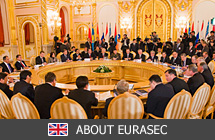
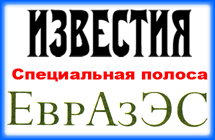
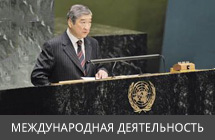
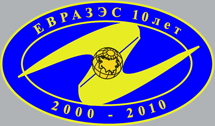
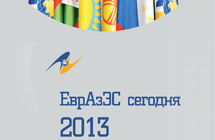
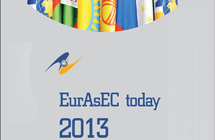
Поиск 10.10.2014 Заседание Межгосударственного совета ЕврАзЭС07.10.2014 Мультимедийная пресс-конференция в агентстве «Россия сегодня»03.10.2014 Встреча с Послом Финляндской Республики04.08.2014 Встреча Генерального секретаря ЕврАзЭС с Послом Республики Таджикистан20.06.2014 Премии Петербургского международного юридического форума «За вклад в развитие правовой интеграции на евразийском пространстве»28.05.2014 Договор о Евразийском экономическом союзе – важнейшее событие в новейшей истории наших стран25.05.2014 Презентация книги «Евразийский проект Нурсултана Назарбаева, воплощенный в жизнь. К 20-летию евразийского проекта 1994–2014»24.05.2014 VII АСТАНИНСКИЙ ЭКОНОМИЧЕСКИЙ ФОРУМ. Панельная сессия «Евразийской экономической интеграции – 20 лет. Итоги и перспективы»24.05.2014 VII Астанинский экономический форум и II Всемирная Антикризисная конференция, 21-23 мая 2014 года, Астана24.05.2014 Петербургский международный экономический форум, 23 – 24 мая 2014 года, Санкт-Петербург |

Евразийское экономическое сообщество
ЕврАзЭС
-
Страны участники
 Беларусь
Беларусь
-
 Казахстан
Казахстан
-
 Кыргызстан
Кыргызстан
-
 Россия
Россия
-
 Таджикистан
Таджикистан
-
 Узбекистан
Узбекистан
-
 Молдова
Молдова
-
 Украина
Украина



